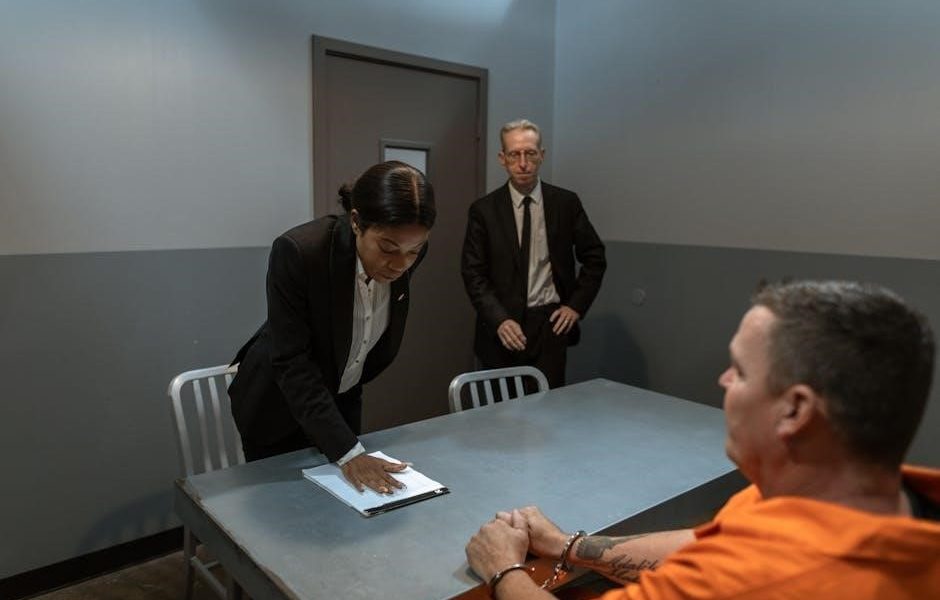
mock trial criminal cases pdf
A mock trial criminal case is an educational tool simulating real courtroom proceedings‚ allowing students to explore legal concepts hands-on. It involves preparing and presenting a fictional criminal case‚ fostering critical thinking and public speaking skills while teaching trial procedures and the role of law in society. Participants act as attorneys‚ witnesses‚ and jurors‚ engaging in a structured competition or classroom activity that promotes deeper understanding of the justice system.
What is a Mock Trial?
A mock trial is a simulated courtroom proceeding where participants act out roles such as attorneys‚ witnesses‚ and jurors to recreate a legal case. It is an educational activity designed to teach students about the legal system‚ trial procedures‚ and critical thinking. Mock trials often involve a fictional criminal or civil case‚ with participants preparing arguments‚ presenting evidence‚ and following courtroom rules. This hands-on experience helps students understand the roles of legal professionals and the dynamics of a trial. Mock trials are commonly used in schools and competitions to engage students in learning about the law and developing public speaking and advocacy skills. They also foster teamwork and a deeper appreciation for the justice system.
Importance of Mock Trials in Legal Education
Importance of Mock Trials in Legal Education
Mock trials play a vital role in legal education by providing students with practical experience in courtroom procedures and legal reasoning. They offer a hands-on approach to understanding the justice system‚ allowing participants to develop critical thinking‚ public speaking‚ and advocacy skills. Mock trials also foster teamwork and problem-solving abilities‚ as students collaborate to prepare and present their cases. By simulating real legal scenarios‚ mock trials help students grasp complex legal concepts and the roles of legal professionals. This experiential learning tool prepares future legal practitioners to navigate the challenges of actual trials‚ making it an invaluable component of legal education programs.
Structure of a Mock Trial Criminal Case
A mock trial criminal case involves structured preparation‚ clear roles for prosecution and defense‚ witness testimonies‚ jury deliberation‚ and adherence to courtroom procedures to simulate real legal proceedings effectively.
Case Preparation and Materials
Preparing for a mock trial criminal case involves creating detailed materials‚ including a case file with witness statements‚ evidence‚ and legal arguments. These materials are essential for students to understand the facts and legal concepts of the case. The case file typically includes a summary of events‚ witness testimonies‚ physical evidence‚ and relevant laws. Students use these materials to prepare opening statements‚ direct and cross-examinations‚ and closing arguments. Proper preparation ensures a realistic simulation of courtroom proceedings‚ helping students grasp the complexities of criminal law and trial procedures. Accessing these materials in PDF format is common for easy distribution and organization.
Key Components of a Criminal Case File
A criminal case file for mock trials includes essential documents like the indictment‚ witness statements‚ physical evidence‚ and legal arguments. The indictment outlines the charges against the defendant‚ while witness statements provide testimony from key individuals. Physical evidence‚ such as photographs or documents‚ supports the case. Legal arguments summarize the prosecution’s and defense’s positions‚ highlighting relevant laws and precedents. These components ensure a comprehensive understanding of the case‚ allowing participants to prepare effectively for trial. They are often provided in PDF format for easy access and distribution‚ ensuring all teams have the same materials to simulate a fair and realistic courtroom experience.
Rules and Procedures in Mock Trials
Mock trials follow structured rules to ensure fairness and realism. Evidence must be pre-approved‚ and courtroom etiquette is enforced. Participants adhere to legal procedures‚ fostering engaging competitions.
Rules of Evidence in Mock Trials
The rules of evidence in mock trials are designed to mimic real courtroom procedures‚ ensuring fairness and authenticity. Evidence must be relevant‚ reliable‚ and properly presented. Participants are barred from using external case law or exhibits unless specified in the case materials. This maintains a level playing field‚ particularly for schools with limited legal resources. Adherence to these rules helps students understand the importance of evidence in building a case. By following these guidelines‚ mock trials promote a realistic learning experience‚ teaching participants about the legal system’s expectations for evidence presentation and admissibility. This fosters critical thinking and practical legal skills.
Courtroom Procedures and Etiquette
Courtroom procedures in mock trials follow real-life protocols to ensure order and respect. Participants must address the judge as “Your Honor” and maintain proper decorum. The court clerk manages administrative tasks‚ while attorneys present their cases. Witnesses testify under oath‚ and jurors listen attentively. Etiquette includes standing when the judge enters‚ avoiding interruptions‚ and speaking clearly. These practices teach students the importance of professionalism and respect for legal processes. By mimicking actual courtroom behavior‚ mock trials help participants understand the structure and dignity of the judicial system‚ fostering a deeper appreciation for the role of law in society. This hands-on experience builds confidence and practical skills.
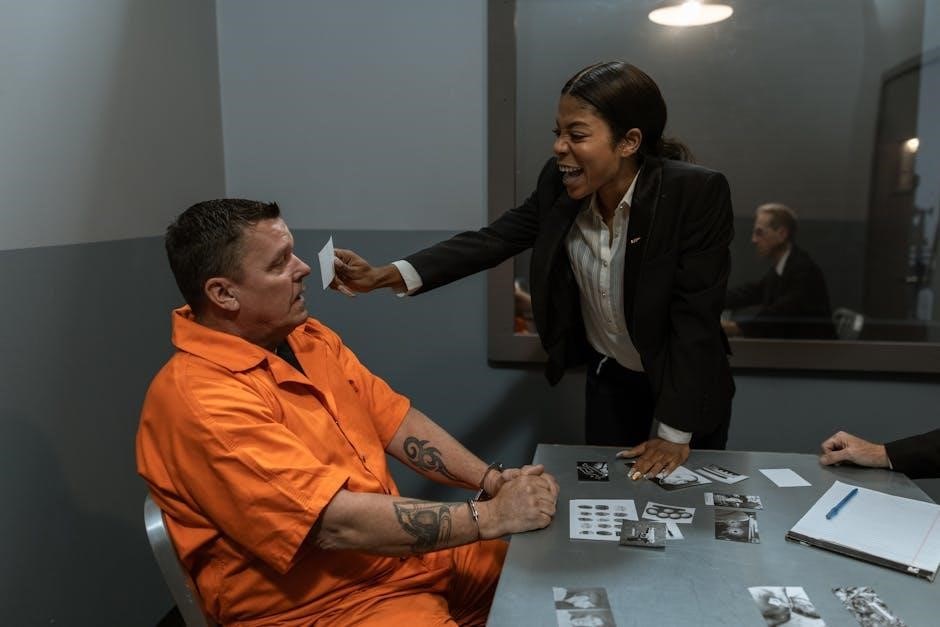
Educational Benefits of Mock Trials
Mock trials enhance critical thinking‚ public speaking‚ and teamwork while fostering respect for the law and its processes‚ enabling practical application of legal knowledge.
Teaching Students About Trial Procedures
Mock trials provide students with a hands-on understanding of trial procedures‚ including opening statements‚ witness examinations‚ and closing arguments. By simulating real courtroom scenarios‚ students gain practical insights into the legal process‚ enabling them to comprehend the roles of attorneys‚ judges‚ and jurors. This interactive approach fosters a deeper appreciation of how evidence is presented and the importance of adhering to rules of evidence. It also helps students develop analytical skills by evaluating case materials and preparing arguments‚ thereby bridging the gap between theoretical knowledge and real-world legal practices.
Developing Critical Thinking and Public Speaking Skills
Mock trials are an exceptional way to cultivate critical thinking and public speaking skills among students. Participants must analyze case materials‚ prepare arguments‚ and articulate their positions clearly in court. This hands-on approach encourages students to think strategically‚ evaluate evidence‚ and respond persuasively under pressure; Public speaking is refined as students deliver opening statements‚ question witnesses‚ and present closing arguments. These experiences build confidence and enhance their ability to communicate complex ideas effectively. By engaging in mock trials‚ students develop essential life skills that extend beyond legal education‚ fostering their ability to think critically and express themselves articulately in various real-world scenarios.
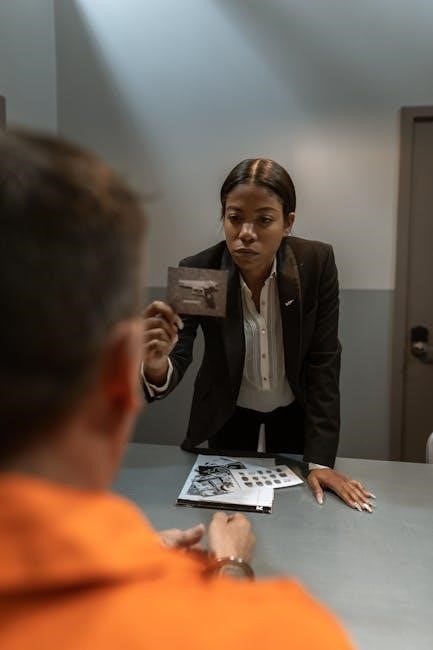
Roles and Responsibilities in a Mock Trial
In a mock trial‚ participants assume distinct roles: prosecution and defense attorneys argue cases‚ witnesses testify‚ judges preside‚ and jurors deliberate. Each role requires preparation and active engagement to simulate real courtroom dynamics effectively.
Attorney Roles: Prosecution and Defense
In a mock trial‚ attorneys play pivotal roles. The prosecution must prove the defendant’s guilt beyond a reasonable doubt‚ presenting evidence and questioning witnesses. The defense aims to create doubt‚ challenging evidence and protecting the defendant’s rights. Both sides deliver opening and closing statements‚ conduct direct and cross-examinations‚ and adhere to rules of evidence. Attorneys must think critically‚ articulate arguments clearly‚ and strategically advocate for their side. These roles teach students about legal procedures‚ ethical practices‚ and the adversarial system‚ preparing them for future careers in law or related fields while fostering public speaking and critical thinking skills.
Witness Roles and Testimony
In mock trials‚ witnesses play a crucial role by providing testimony based on the case materials. They are typically students or volunteers who portray fictional characters‚ such as victims‚ experts‚ or bystanders. Witnesses must remain in character and answer questions based solely on the information provided in the case file. During direct examination‚ the attorney calling the witness asks questions to elicit favorable testimony‚ while cross-examination challenges the witness’s credibility and reliability. Witnesses must prepare thoroughly‚ reviewing their statements and anticipating questions. Their testimony can significantly influence the trial’s outcome‚ making their role essential in educating students about evidence presentation and courtroom dynamics.
Judge and Jury Roles
The judge presides over the mock trial‚ ensuring adherence to rules and maintaining courtroom order. They rule on objections‚ manage questioning‚ and guide the proceedings fairly. The jury‚ composed of students or community members‚ listens to testimony‚ evaluates evidence‚ and deliberates to reach a verdict. Jurors must remain impartial‚ basing their decision solely on the case presented. In educational settings‚ the jury’s deliberation process is often guided to teach critical thinking and teamwork. Both roles are essential for simulating a realistic legal experience‚ helping participants understand the judicial process and the importance of impartial decision-making in the justice system.
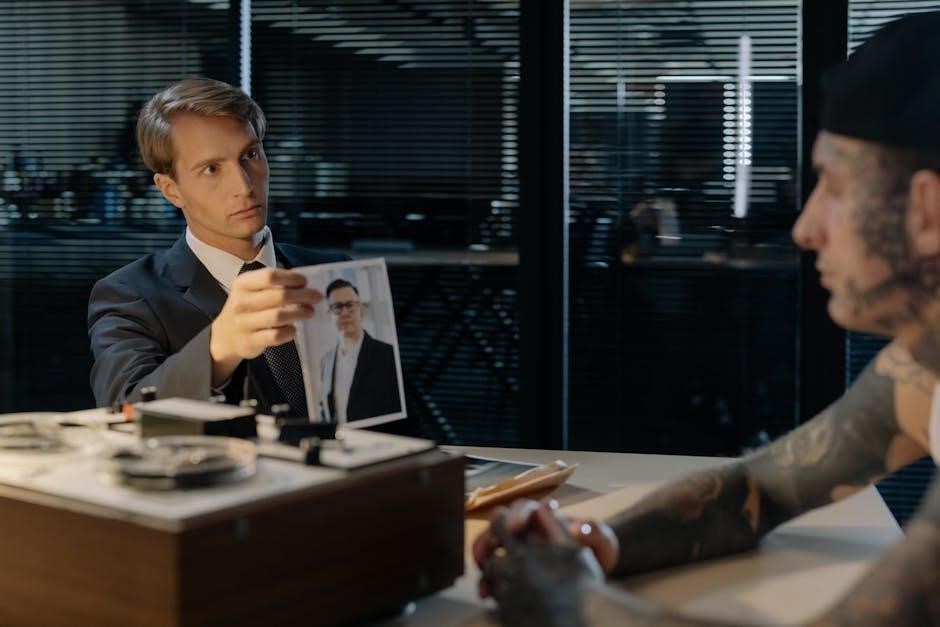
How to Run a Mock Trial
Organize roles‚ prepare case materials‚ and schedule sessions. Assign attorneys‚ witnesses‚ and jurors‚ ensuring understanding of rules and procedures. Conduct the trial systematically‚ fostering engagement and learning.
Step-by-Step Guide to Organizing a Mock Trial
Select a mock trial criminal case from available resources or educational programs. 2. Assign roles: prosecution‚ defense‚ witnesses‚ judge‚ and jury; 3. Distribute case materials‚ including witness statements and evidence. 4. Conduct a pre-trial meeting to review rules and procedures. 5. Set up the courtroom with appropriate seating and materials. 6. Begin the trial with opening statements‚ followed by witness testimony and cross-examination. 7. Conclude with closing arguments and jury deliberation. 8. Debrief to discuss performance and legal concepts learned. This structured approach ensures an engaging and educational experience for participants.
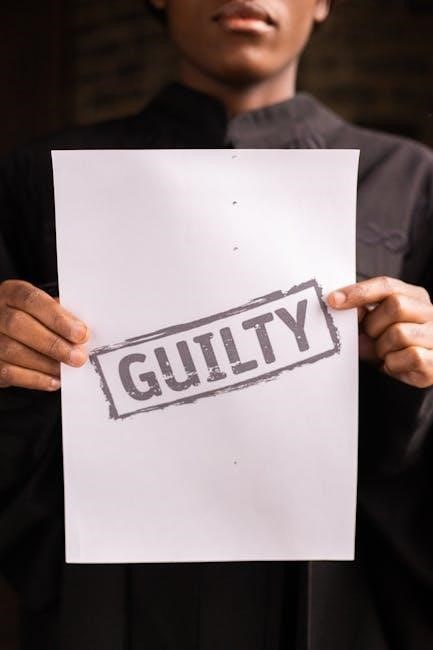
Resources for Mock Trial Cases
Download mock trial criminal cases in PDF from educational programs like the Law-Related Education Program or the Wisconsin High School Mock Trial Program. These resources offer structured case materials‚ including witness statements‚ evidence‚ and trial scripts‚ designed for classroom or competition use.
Downloading Mock Trial Cases in PDF Format
Mock trial criminal cases in PDF format are widely available from educational programs and legal organizations. These resources provide detailed case summaries‚ witness statements‚ evidence‚ and scripts tailored for mock trials. Websites like the Law-Related Education Program and state-specific mock trial associations offer downloadable materials. PDFs are designed for easy access and printing‚ making them ideal for classroom activities or competitions. They often include structured formats for criminal cases‚ ensuring a realistic and immersive experience. Many programs update their cases annually‚ reflecting current legal scenarios. Downloading these PDFs allows educators and participants to organize and conduct mock trials effectively‚ fostering engagement and understanding of legal procedures.
Impact of Mock Trials on Legal Understanding
Mock trials foster respect for the legal system‚ promoting justice awareness and understanding of court procedures. They inspire youth to engage with the rule of law‚ encouraging active participation in civic life while building appreciation for legal processes and their significance in society. Through hands-on experiences‚ mock trials bridge the gap between theoretical learning and practical application‚ enriching students’ comprehension of the judicial system’s role in maintaining order and justice.
Fostering Respect for the Legal System
Mock trials play a pivotal role in fostering respect for the legal system by providing students with a firsthand experience of courtroom dynamics. Through participation‚ students gain a deeper understanding of the judicial process‚ learning about the roles of attorneys‚ judges‚ and jurors. This hands-on approach helps demystify the legal system‚ making it more accessible and relatable. By engaging with mock trials‚ students develop an appreciation for the principles of justice and the rule of law‚ which are foundational to a functioning society. This respect is further cultivated through the structured and fair competition that mock trials inherently promote.
Leave a Reply
You must be logged in to post a comment.